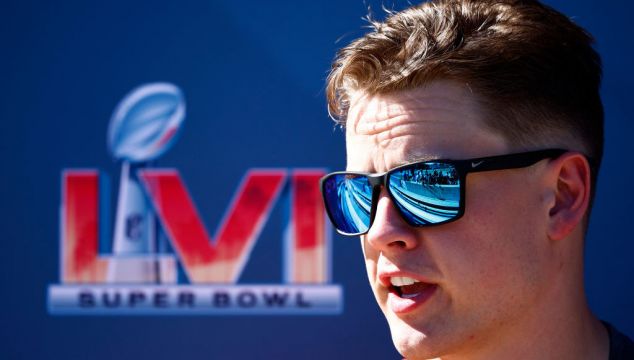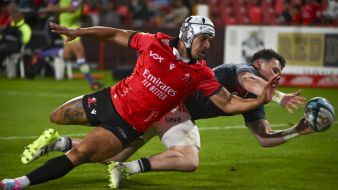The Cincinnati Bengals have crashed the Super Bowl after winning a total of just six games over the previous two seasons.
They look to punctuate their stunning turnaround with the franchise's first title when they battle the Los Angeles Rams on Sunday in Super Bowl LVI at Inglewood, Calif.
The Bengals are the fifth team this century to be a last-place team one season and in the Super Bowl the next.
Progress was expected in coach Zac Taylor's third season at the helm, but few were forecasting this type of jump for a Cincinnati franchise that hadn't won a playoff game since the 1990 season.
Taylor insists the magical season -- 10-7 plus three postseason wins, including rallying from 18 down to beat the Kansas City Chiefs 27-24 in overtime in the AFC Championship Game -- isn't a shock.
"It's not really a surprise to us," Taylor said Wednesday. "There are going to be hard times while you build a foundation. Our guys bought into that and we knew that was going to shape us moving forward. ...
"I can't think of any other way to go through this journey than the way we did."
One more time on the practice field. pic.twitter.com/pO05XZsOse
— Los Angeles Rams (@RamsNFL) February 12, 2022
The Bengals are appearing in the Super Bowl for the third time. They twice lost to the San Francisco 49ers, after the 1981 and 1988 seasons.
The Rams, playing in their home stadium, are making their second Super Bowl appearance in four seasons. The franchise is 1-3 in Super Bowls, with the lone victory coming after the 1999 season, when the Rams were housed in St. Louis and Kurt Warner and Marshall Faulk were the stars.
Los Angeles also staged a comeback to reach this point, overcoming a 10-point, fourth-quarter deficit to beat the San Francisco 49ers 20-17 in the NFC title game.
Normal routine
When the Rams fell 13-3 to the New England Patriots in the Super Bowl following the 2018 season, they appeared out of sync offensively.
Los Angeles coach Sean McVay admitted this week that he didn't stick to his scheduled game plan. Instead, he kept tinkering with things, and it created issues.
McVay said he learned from the experience and is trying to keep his players in a normal routine.
"You don't minimize what a great opportunity has been earned by both teams," McVay said. "You want to take in the magnitude of the game, but you don't want to do it to the point where guys are overwhelmed. You want to keep a normal rhythm of the routine during the week."
McVay (36) and Taylor (38) comprise the first Super Bowl matchup in which both coaches are under 40 years old. Taylor was an assistant for the Rams under McVay for two seasons (2017-18) prior to becoming the Bengals' coach.
Los Angeles quarterback Matthew Stafford (4,886 passing yards, 41 touchdowns, 17 interceptions in the regular season) has enjoyed a solid postseason with 905 yards, six TDs and one interception. He is 3-0 in this season's playoffs after going 0-3 in the postseason over 12 years with the Detroit Lions, who dealt him to the Rams last offseason.
Bengals quarterback Joe Burrow (4,611 yards, 34 touchdowns, 14 interceptions in the regular season) has exceeded expectations in his second NFL campaign, particularly during the team's stellar postseason run. He has thrown for 842 yards with four TDs and two picks in the playoffs.
"He plays with a lot of swag and a lot of heart, he wants it," Rams star cornerback Jalen Ramsey said of Burrow. "That's contagious to his teammates, and they take on that persona as well. Talent-wise and skill-set, he has it all. He can make all the throws."
Burrow, who completed an NFL-best 70.4 percent of his passes, identifies maintaining focus as his main objective.
"The team that handles those distractions the best is going to end up winning the game," Burrow said. "You see guys who go their entire career without ever getting to the Super Bowl, so when you do get there, you have to hunker down and take advantage of those opportunities."
Cincinnati rookie wideout Ja'Marr Chase set franchise single-game (266) and single-season receiving-yardage (1,455) marks, while the Rams' Cooper Kupp led the NFL in receptions (145), receiving yardage (1,947) and touchdown catches (16).
Rams star defensive tackle Aaron Donald (12.5 sacks) leads the Los Angeles defense, while Bengals linebacker Logan Wilson (four interceptions, 98 tackles) excelled in his second season.
American football terms:
Touchdown: A score, worth six points, that occurs when a player in possession of the ball crosses the plane of the opponent's goal line, when a player catches the ball while in the opponent's end zone, or when a defensive player recovers a loose ball in the opponent's end zone.
Backfield: The group of offensive players — the running backs and quarterback — who line up behind the line of scrimmage.
Down: A period of action that starts when the ball is put into play and ends when the ball is ruled dead (meaning the play is completed).
The offense gets four downs to advance the ball 10 yards. If it fails to do so, it must surrender the ball to the opponent, usually by punting on the fourth down.
Drive: The series of plays when the offense has the football, until it punts or scores and the other team gets possession of the ball.
End zone: A 10-yard-long area at each end of the field. You score a touchdown when you enter the end zone in control of the football. If you're tackled in your own end zone while in possession of the football, the other team gets a safety.
Extra point: A kick, worth one point, that's typically attempted after every touchdown (it's also known as the point after touchdown, or PAT).
The ball is placed on either the 2-yard line (in the NFL)) and is generally kicked from inside the 10-yard line after being snapped to the holder. It must sail between the uprights and above the crossbar of the goalpost to be considered good.
Field goal: A kick, worth three points, that can be attempted from anywhere on the field but is usually attempted within 40 yards of the goalpost. Like an extra point, a kick must sail above the crossbar and between the uprights of the goalpost to be ruled good.
Fair catch: When the player returning a punt waves his extended arm from side to side over his head. After signaling for a fair catch, a player can't run with the ball, and those attempting to tackle him can't touch him.
Fumble: The act of losing possession of the ball while running with it or being tackled. Members of the offense and defense can recover a fumble. If the defense recovers the fumble, the fumble is called a turnover
Huddle: When the 11 players on the field come together to discuss strategy between plays. On offense, the quarterback relays the plays in the huddle.
Incompletion: A forward pass that falls to the ground because no receiver could catch it, or a pass that a receiver dropped or caught out of bounds.
Interception: A pass that's caught by a defensive player, ending the offense's possession of the ball.
Kickoff: A free kick (meaning the receiving team can't make an attempt to block it) that puts the ball into play. A kickoff is used at the start of the first and third quarters and after every touchdown and successful field goal.
Line of scrimmage: An imaginary line that extends from where the football is placed at the end of a play to both sides of the field. Neither the offense nor the defense can cross the line until the football is put in play again.
Offensive line: The human wall of five men who block for and protect the quarterback and ball carriers. Every line has a center (who snaps the ball), two guards, and two tackles.
Punt: A kick made when a player drops the ball and kicks it while it falls toward his foot. A punt is usually made on a fourth down when the offense must surrender possession of the ball to the defense because it couldn't advance 10 yards.
Red zone: The unofficial area from the 20-yard line to the opponent's goal line. Holding an opponent to a field goal in this area is considered a moral victory for the defense.
Sack: When a defensive player tackles the quarterback behind the line of scrimmage for a loss of yardage.
Safety: A score, worth two points, that the defense earns by tackling an offensive player in possession of the ball in his own end zone.
Snap: The action in which the ball is hiked (tossed between the legs) by the center to the quarterback, to the holder on a kick attempt, or to the punter. When the snap occurs, the ball is officially in play and action begins.







